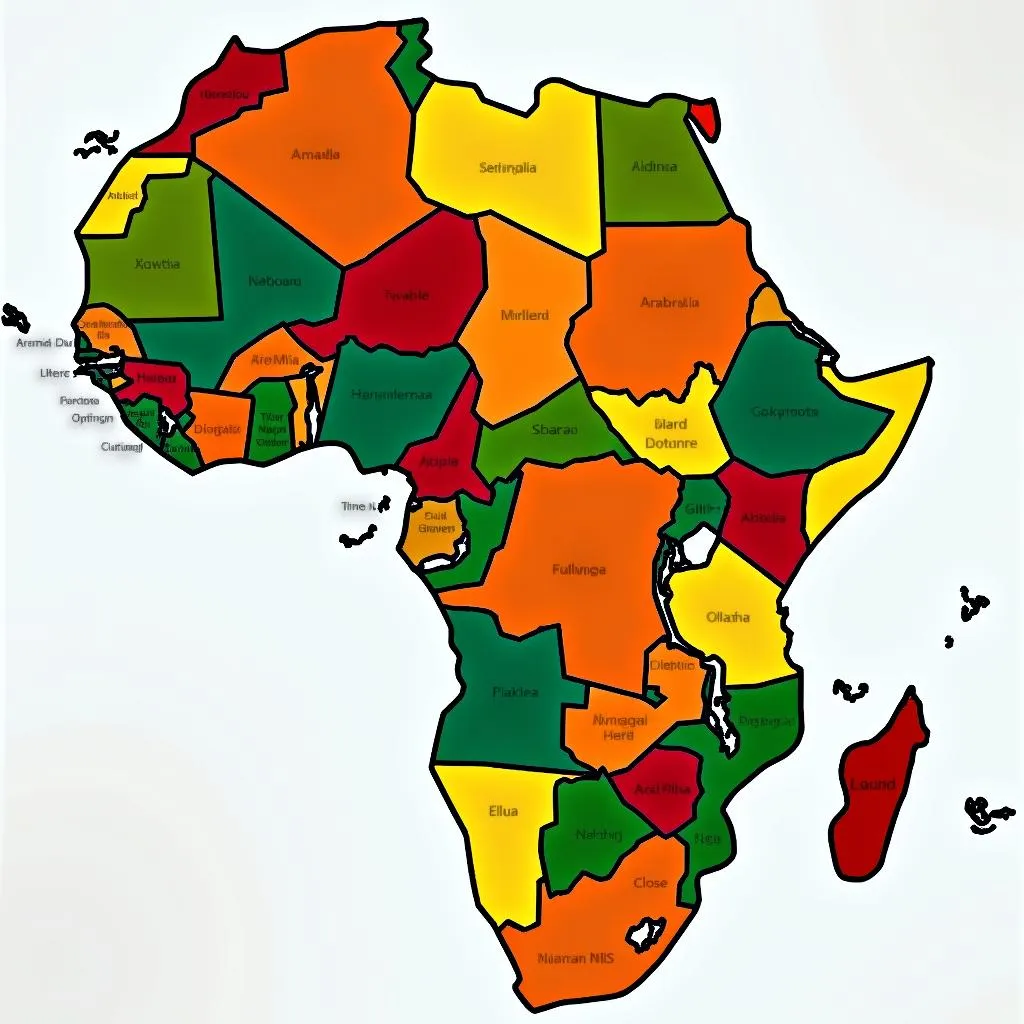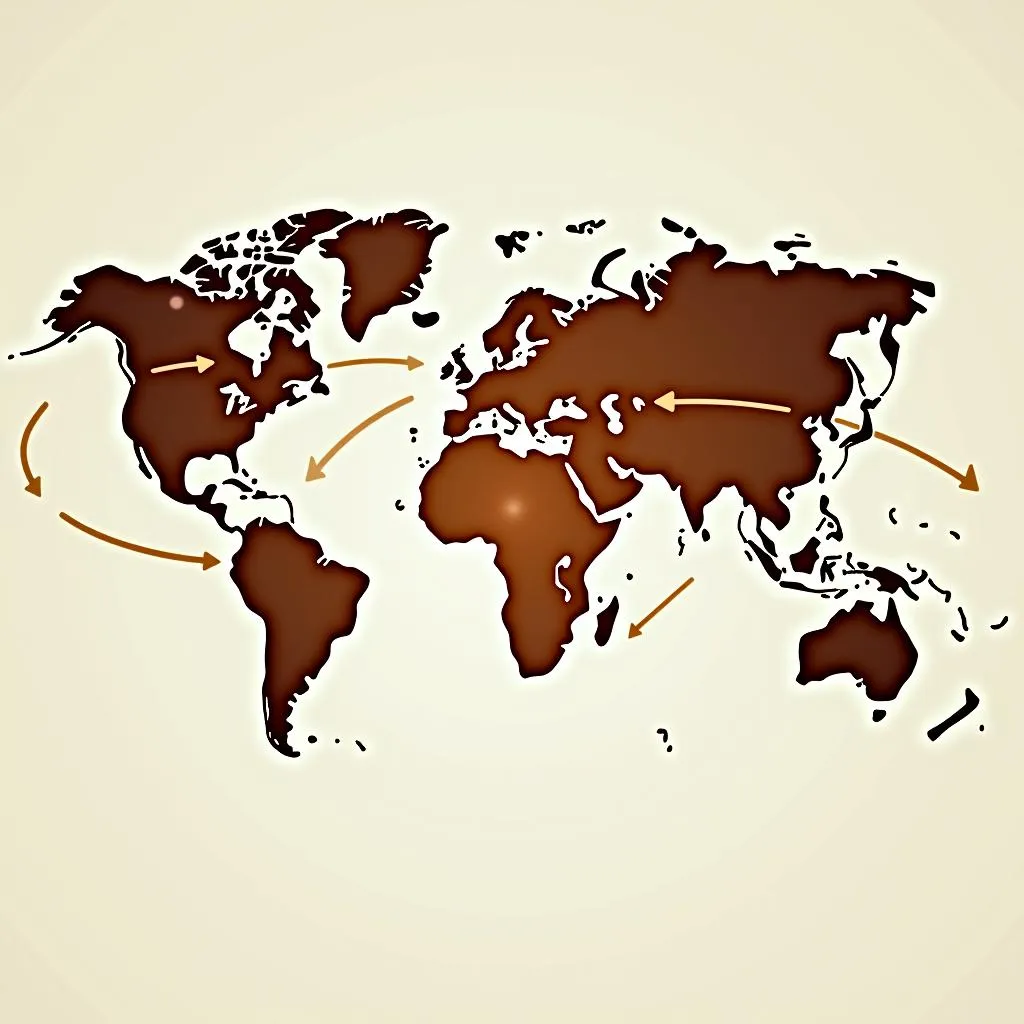Unraveling the Story Told by 1 African DNA
The concept of “1 African Dna” might seem simplistic, given the vast diversity of the continent. Africa is the cradle of humankind, a tapestry woven with countless threads of history, culture, and most importantly, genetics. While there is no single “African DNA,” the genetic makeup of African populations holds a wealth of information, unlocking secrets about our shared human ancestry and the complex journey of our species.
The Rich Tapestry of African Genetic Diversity
 Map of African ethnic groups with diverse genetic makeup
Map of African ethnic groups with diverse genetic makeup
To understand the significance of African DNA, we must first acknowledge its incredible diversity. Within Africa, there is more genetic variation than anywhere else on Earth. This diversity is a result of millions of years of human evolution, adaptation, and migration within the continent. Researchers have identified distinct genetic clusters within Africa, each with its own unique set of genetic markers and variations. These variations offer insights into ancient migration patterns, tribal connections, and even susceptibility to certain diseases.
The Out of Africa Theory and African DNA
The study of African DNA is crucial to understanding the “Out of Africa” theory, which posits that all modern humans originated from a single population in Africa and subsequently migrated to other parts of the world. Genetic evidence strongly supports this theory, with research indicating that modern humans first appeared in Africa approximately 300,000 years ago.
 Illustration depicting human migration routes from Africa to other continents
Illustration depicting human migration routes from Africa to other continents
The DNA of African populations holds the key to tracing these ancient migration routes and understanding how humans populated the globe. By comparing the genetic makeup of different populations, scientists can reconstruct migration paths and estimate when different groups diverged from one another.
Implications for Health and Medicine
The study of 1 African DNA also has profound implications for health and medicine. The genetic diversity within Africa has led to unique adaptations to various environments and diseases. For instance, some African populations have developed genetic resistance to certain diseases like malaria. Understanding these genetic variations can help in the development of new drugs and therapies tailored to specific populations.
Furthermore, African DNA research is shedding light on the genetic basis of complex diseases that are prevalent worldwide, such as diabetes, heart disease, and cancer. This information can be used to develop more effective prevention and treatment strategies.
Tracing Ancestry and Cultural Heritage
For individuals of African descent, exploring their DNA can be a powerful journey of self-discovery. Genetic testing can reveal ancestral origins, tribal affiliations, and migration patterns, connecting individuals to their rich cultural heritage.
 A multi-generational African family looking at a DNA test result with smiles
A multi-generational African family looking at a DNA test result with smiles
“I was surprised to learn that my ancestors were part of the Bantu migration that spread across much of southern Africa,” says Amina, a Kenyan woman who recently took a DNA test. “It’s amazing to think about the journey they took and how it shaped who I am today.”
1 African DNA: A Window to Our Shared Humanity
While the concept of “1 African DNA” might be a simplification, it underscores the shared ancestry and interconnectedness of all humans. The study of African DNA is not just about understanding the past; it’s about shaping the future of healthcare, medicine, and our understanding of human diversity.
By unraveling the intricate story told by 1 African DNA, we can gain a deeper appreciation for our shared human heritage and build a more inclusive and equitable future for all.
FAQ
1. What is the significance of African DNA in understanding human evolution?
African DNA is crucial for understanding human evolution because it holds the greatest genetic diversity among all human populations, providing insights into our origins, migrations, and adaptations.
2. How can studying African DNA contribute to medical advancements?
African DNA research can lead to the development of new drugs and therapies tailored to specific populations, as well as a better understanding of the genetic basis of diseases.
3. Can DNA testing help people of African descent trace their ancestry?
Yes, DNA testing can provide valuable information about ancestral origins, tribal affiliations, and migration patterns for individuals of African descent.
4. What are some of the ethical considerations related to African DNA research?
Ethical considerations include ensuring informed consent, equitable benefit-sharing, and respecting the cultural sensitivities of African communities.
5. Where can I find more information about African DNA and genetic research?
You can find more information on African genetic diversity implications and African genes DNA found in Tamil Tamilians.
Looking for more information?
Explore our other articles on African American names and surnames and African animals names A-Z. We also have a fascinating piece on 30 African ancestry you might enjoy.
For any further questions or assistance, please do not hesitate to contact us. You can reach us via:
Phone Number: +255768904061
Email: [email protected]
Address: Mbarali DC Mawindi, Kangaga, Tanzania.
We have a dedicated customer care team available 24/7 to assist you.



